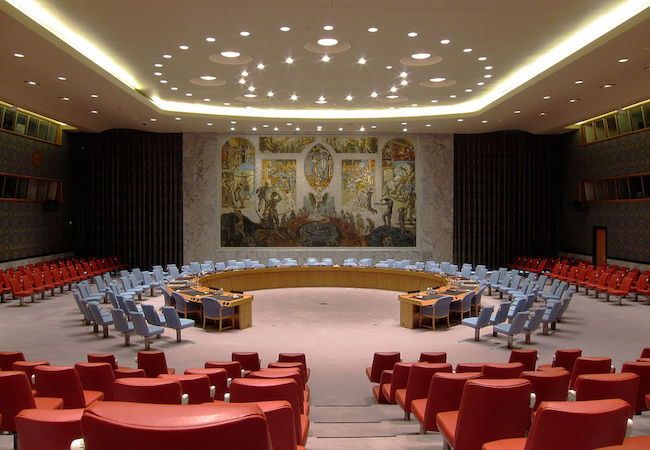
By Patricia Galves Derolle
Should Brazil (along with other BRICS members) continue to insist in the UN Security Council Reform?
For a long time Brazil wants to be part of the political condo of power, which is the UN Security Council. The Brazilian claim appears to be worthy, as it demands a new geopolitical dynamics of the world. It is true that the organization focused on Peace and International Security has retrograde composition, which refers to the post-Second World War years. While some member countries, thinkers and UN officials agree with the reform, the divergence lies in several questions: number of members, geographic limitations, the use of the veto and administrative issues, such as the amendment to the Charter, and financial resources.
Since the League of Nations Brazil is interested in becoming part of the Security Council. Although the United States established what would be the League of Nations and later the United Nations, the country did not participate fully in the first multilateral organization because of the bill’s blockade by the US Congress. So, with the gap of an American representative in the Security Council, Brazil proposes, in 1921, to be the regional representative, however it fails to succeed. It becomes therefore a non-permanent member, asking to leave the organization in 1928, when it realizes that its pursuit to become a permanent member would never be accepted.
After replacing the League of Nations by the United Nations, Brazil requested once again to be part of the body that represents peace and global security, but it was not successful again, as American interests would therefore be represented by the United States. In 1965, the Council passed through its only reform: it increased the number of non-permanent seats from 6 to 10, remaining 5 nations as permanent members (United States, Great Britain, France, Russia, and China). The reason for this reform lies most importantly in the fact that the United Nations increased its total number of member countries, however, the most powerful nations, the Permanent 5, remained the same.
Until 2010 there was continuity in the Brazilian foreign policy with regards to policies for UN Security Council reforms. Brazilian actions had gradual but slow progression. The G-4, comprising Brazil, India, Japan and Germany, reinforced the representation and the convergence to change the status quo of the international security body. Moreover, Brazil’s performance in peacekeeping missions under the title coined by Brazil “Responsibility while Protecting” instead of “Responsibility to Protect” also proved to be very efficient and effective at that time, especially the Brazilian role in Haiti through MINUSTAH.
The Responsibility while Protecting [1], a proposition that corroborated more with the Brazilian demand in world affairs, stated that the right of interference, mentioned in the UN Charter, should be used with respect to principles and with predetermined parameters, for instance, limiting the use of force, using it only when necessary, but also under Security Council authorization. So Brazil proved to prefer “Peacebuilding” instead of “Peace Enforcement”. This pacific and humanitarian narrative of Brazil strengthened, in part, both its claim to have a permanent seat and Brazil’s performance in the body.
Currently, the Brazilian permanent campaign (VARGAS, 2011) to reform the Security Council is frozen. Although President Dilma Rousseff has supported the reform and stated in her speech at the 69th UN General Assembly, Brazil seems to have no credentials to do so anymore, because it sort of lacks the enthusiasm that had before, and also because it has no specific direction to the theme. In recent and important global issues (Ukraine and Syria), Brazil did not positioned firmly.
Concerning peace missions, an area that Brazil is a traditional contributor, the challenge now is its low financial support to the Department of Peacekeeping Operations (DPKO). In a recent article [2], the representative of the Department, Herve Ladsous, said that the low cooperation of member countries is shrinking, which leads him to act with “versatility and creativity” in its mandate. Of the resources donated to the body, Brazil has the lowest numbers compared to other emerging countries, countries which do not have the same Security Council Reform narrative as Brazil, nor tried to coin an important term that could be propagated and used more often as the legal basis of peacekeeping missions: the Responsibility while Protecting.
Brazil therefore should insist and persist on the Reform of the Security Council, but before that, its discourse must be coherent and consistent with Brazilian goals. If the country wants to be part of a reformed political condo, it needs a priori to coordinate its strategies to maintain the homogeneity of its narrative. It makes no sense plead reforms without having the certainty that the country will be able to hold their shares in the future.
Moreover, beyond the already mentioned objective ideas, Brazil also needs to overcome the problems related to its Armed Forces, its performance in Peacekeeping Missions, its financial aid to the UN budget, and its lack of empathy and support from Latin American countries. In this way, to propose a new configuration of world power is a worthy cause and it should be part of a long-term goal. To slowly transform the world’s “unipolarity” into multipolarity is essential so that important issues can be discussed in a global scale, as well as considered and analyzed by great powers, developing and poor countries. To demand for change, particularly at the most important UN body, it will always be something worth fighting for.
Patricia Galves Derolle is the founder of Internacionalista and resides in São Paulo, Brazil
Original article published by the www.moderndiplomacy.eu




